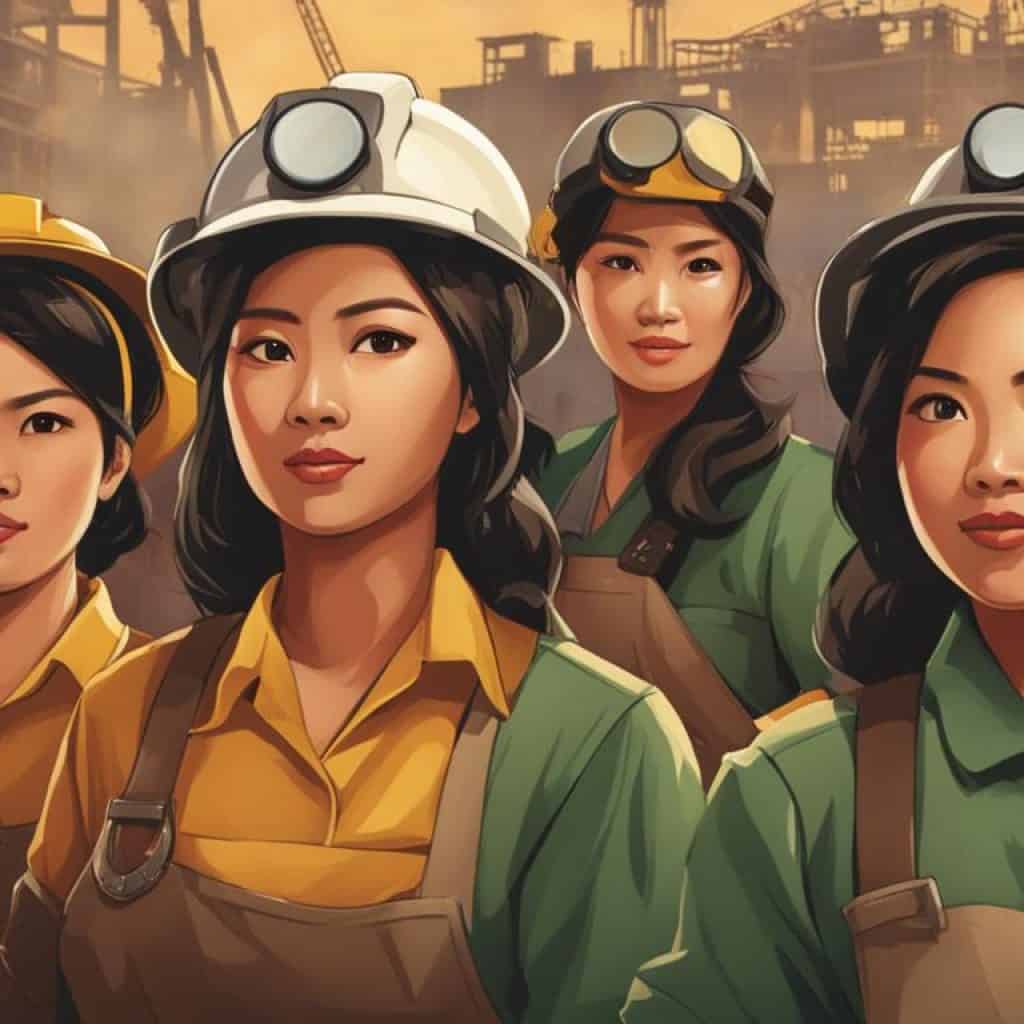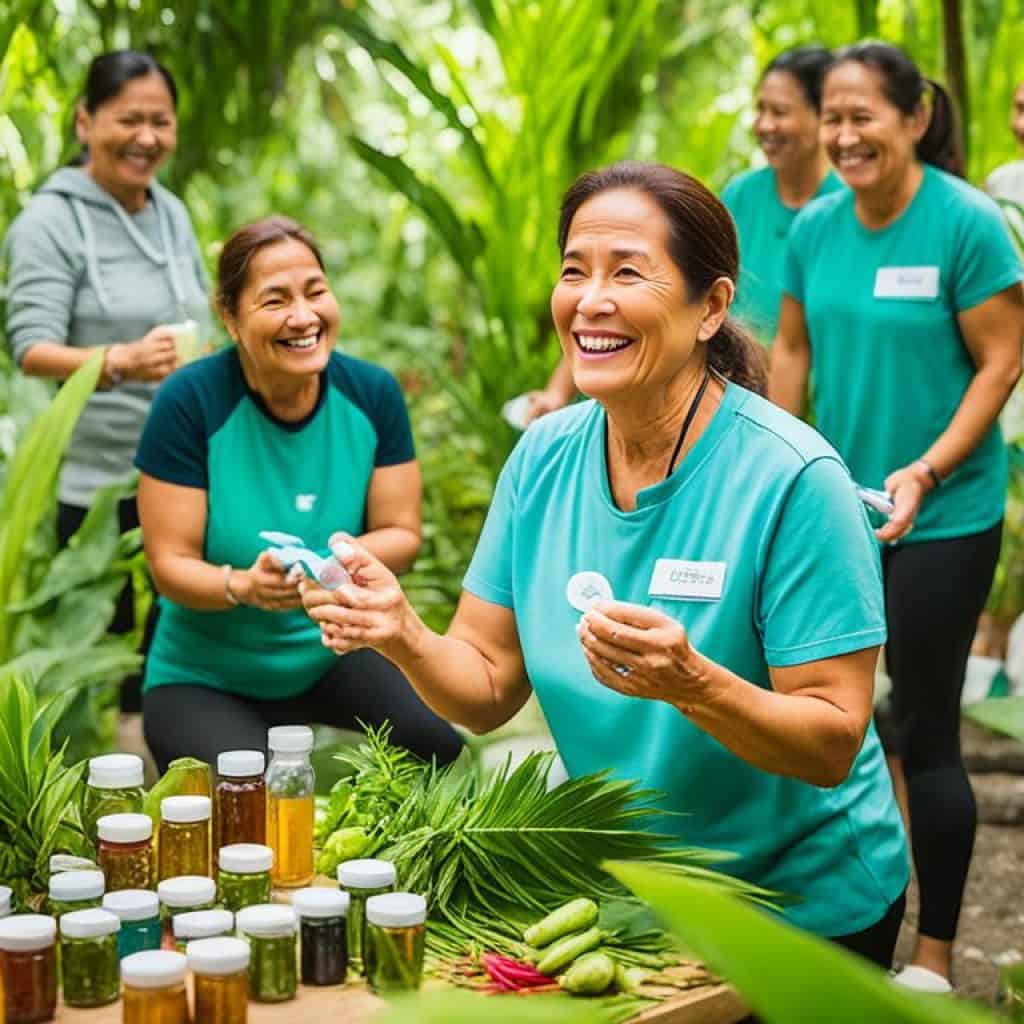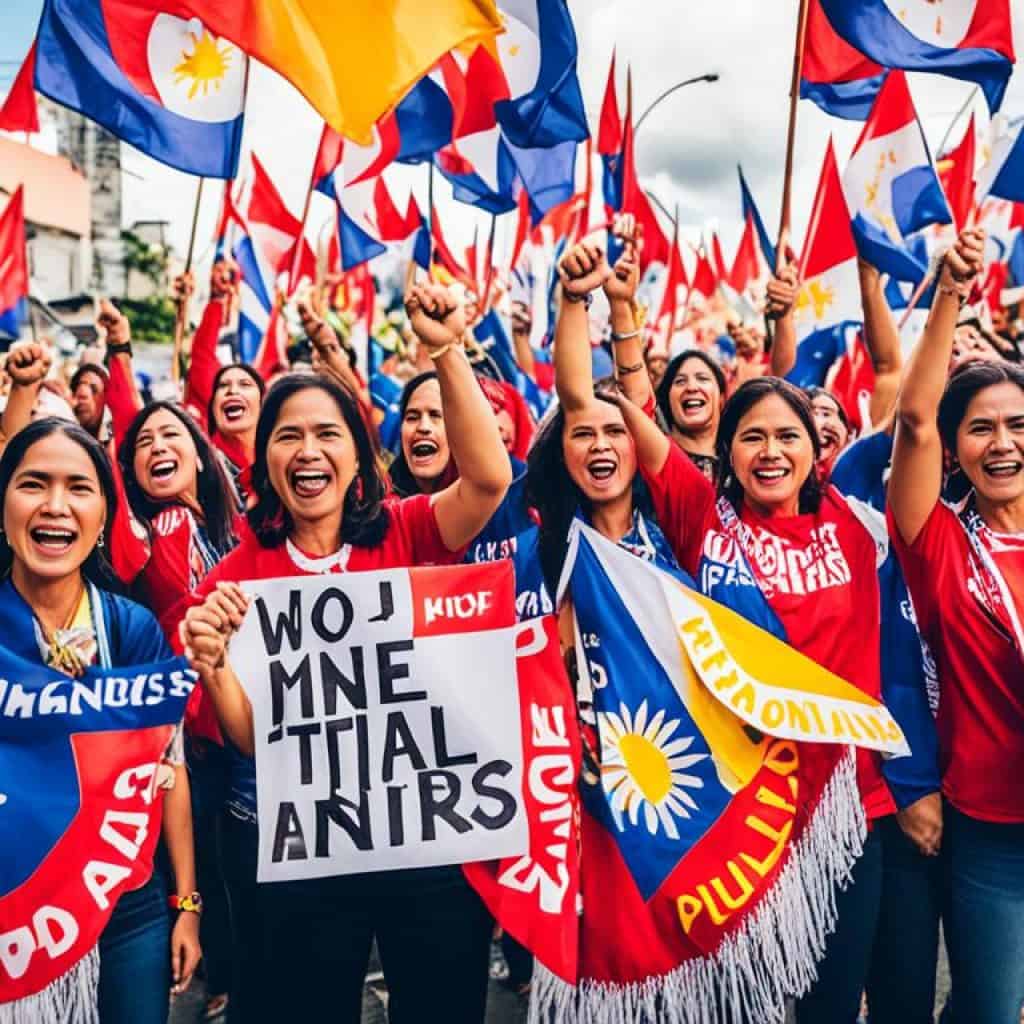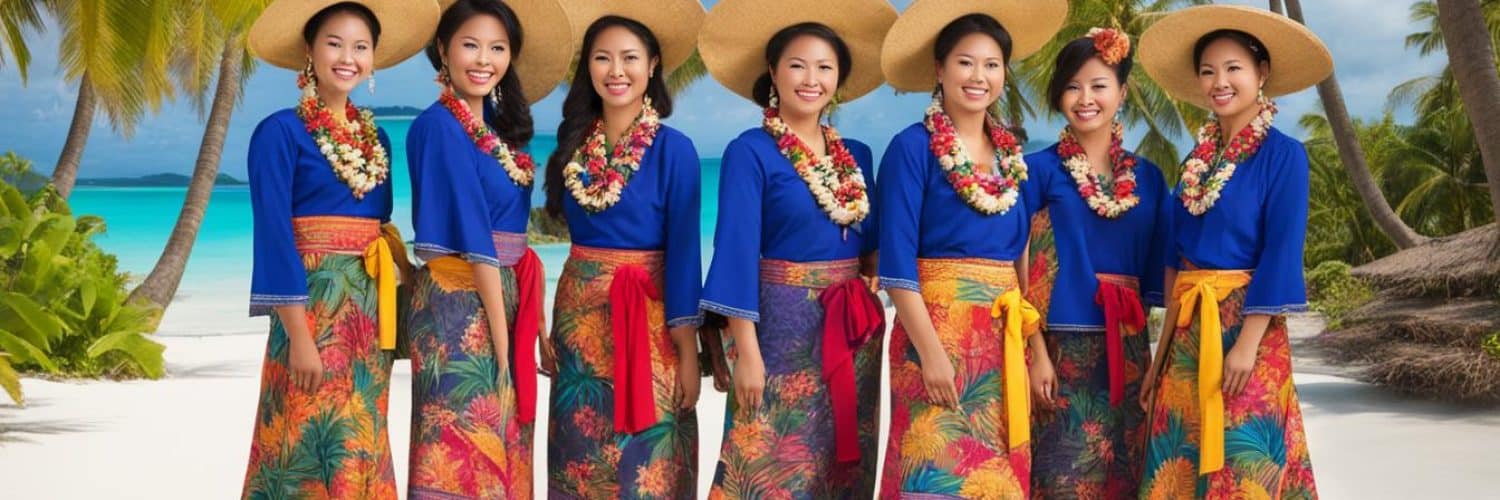When it comes to the charm and values of women, the Philippines is a country that stands out. Philippine women, also known as Filipinas, are renowned for their strength, intelligence, and significant contributions to their families, businesses, and government agencies. With their remarkable qualities and vibrant culture, Filipinas have a unique allure that captivates people from all around the world.
In this article, we will delve into the role of women in Filipino society, the cultural context that shapes their experiences, the beauty that they possess, and the values they hold dear. From their academic achievements to their involvement in politics, the remarkable strength and capabilities of Filipino women continue to shape the country’s progress and development.
Key Takeaways:
- Philippine women, also known as Filipinas, are highly valued for their strength, intelligence, and contributions to society.
- Women in the Philippines play significant roles in their communities and families, being primary caretakers and decision-makers.
- Filipino women are known for their stunning physical appearance, often described as feminine and girly.
- Filipinas possess excellent caregiving abilities, honesty, and a romantic nature, making them desirable partners.
- Education is highly valued for Filipino women, with opportunities for pursuing professional careers.
The Role of Women in Filipino Society
Women in the Philippines play a significant role in their communities and families. They are the backbone of society, often serving as the primary caretakers and decision-makers. Filipino women contribute to the success of businesses, government agencies, and even traditional haciendas.
Filipino society values the importance of women and recognizes their immense contributions in various sectors. Their dedication and hard work can be seen in their roles as mothers, caregivers, professionals, and community leaders.
“The contribution of women in Filipino society is immeasurable. They bring strength, compassion, and resilience to everything they do.”
As caretakers, Filipino women not only attend to the needs of their immediate families but also extend their care and support to the broader community. They play vital roles in maintaining harmony within their households and ensuring the well-being of their loved ones.
Furthermore, Filipino women have proven their competence and excellence in the workforce. They excel in various fields, such as education, healthcare, law, business, and the arts. Their contributions and achievements pave the way for brighter opportunities for future generations of Filipino women.
In Filipino society, women are also actively involved in decision-making processes. Their voices are heard and respected, and their opinions hold weight in matters that affect their communities and the nation as a whole.
The unwavering strength, resilience, and determination exhibited by Filipino women have become sources of inspiration not only to their fellow women but to society as a whole. Filipino women are living testaments that gender should never be a hinderance to achieving success.
Empowering Filipino Women
Efforts to empower Filipino women have gained momentum in recent years. With advancements in women’s rights and the recognition of their capabilities, Filipino women have been provided with more opportunities and resources to thrive. Organizations and individuals alike continuously strive to promote gender equality and uplift the status of Filipino women in society.
Despite the challenges and obstacles they face, Filipino women continue to prove their worth and make significant contributions to society. Their accomplishments and resilience serve as a reminder of their indispensable role in shaping not only Filipino society but also the world.
The Resilience of Filipino Women
The resilience of Filipino women is a testament to their strength and determination. In the face of adversity, Filipino women have time and again emerged as pillars of strength for their families, communities, and the nation. They exemplify the values of compassion, courage, and fortitude, inspiring those around them to persevere and create positive change.
The Cultural Context of Filipino Women
In the Philippines, women hold a revered position within Filipino culture, adhering to traditional standards and mindsets. Despite the country’s strong patriarchal society, Filipino women wield significant influence and actively engage in various aspects of life, including dating and marriage.
The cultural context of Filipino women shapes their values and behaviors, highlighting the importance of family, respect, and modesty. These cultural influences greatly impact the dynamics of relationships and marriage in the Philippines.
When it comes to dating Philippine women, understanding their cultural background is crucial. Filipino women seek long-term commitment and view dating as a significant step towards finding a life partner. Honesty, loyalty, and mutual respect are highly valued traits in Filipino relationships.
Traditional Filipina Values
Filipino women strongly adhere to traditional values of love, respect, and loyalty. The concept of “utang na loob,” or debt of gratitude, plays a significant role in Filipino culture and influences relationships. This concept instills a sense of reciprocity, where individuals show appreciation and repay kindness shown to them.
Filipino women also prioritize close family ties and ensure the welfare of their loved ones. They embody the essence of “bayanihan,” which represents the spirit of communal unity, cooperation, and mutual help within Filipino communities.
Dating and Marriage in the Philippines
Dating and marriage hold great significance in Filipino culture. Filipino women place emphasis on building a strong foundation of love, trust, and commitment before entering into marriage. They seek partners who share their values and are dedicated to creating a harmonious and supportive relationship.
Traditionally, Filipino women are known for their modesty and feminine qualities, emphasizing their roles as caring and nurturing partners. They value loyalty and expect the same level of commitment from their partners.
Filipino women embody strength, resilience, and unwavering dedication to their relationships and families. They make loving and devoted partners, with a deep understanding of the cultural context that shapes their roles.
The Influence of Modernization
Although deeply rooted in tradition, Filipino women have also been influenced by modernization and globalization. The advent of technology and access to international media have exposed them to new ideas and perspectives.
This exposure has contributed to the increasing empowerment and independence of Filipino women. They are actively pursuing education, career opportunities, and personal growth while balancing their traditional roles and cultural values.
It is essential to approach dating and relationships with Filipino women with a nuanced understanding of their cultural context, respecting their values and aspirations. Open communication, mutual respect, and willingness to embrace both tradition and modernity are essential for building a successful and fulfilling relationship with a Filipina.
| Aspect | Traditional Values | Influence of Modernization |
|---|---|---|
| Family | Strong emphasis on close family ties, putting family welfare first. | Balancing traditional values with modern priorities, such as pursuing education and career opportunities. |
| Gender Roles | Traditional gender roles, with women assuming caregiver and nurturing roles. | Increasing empowerment of women, pursuing education, career, and leadership opportunities. |
| Relationships | Emphasis on commitment, loyalty, and building a strong foundation of trust and love. | Exposure to modern ideas and global influences, embracing new relationship dynamics. |
| Marriage | Viewed as a lifelong commitment, with a focus on creating a harmonious and supportive partnership. | Balancing traditional values with evolving expectations and individual aspirations in marriage. |
The Beauty of Filipina Women
Filipina women are renowned for their exquisite physical features and captivating appearance. They possess natural beauty that is often admired and sought after by people from around the world.
With shapely bodies, golden skin, almond-shaped eyes, and beautiful dark hair, Filipina women exude a unique charm and allure.
They are often described as feminine and girly, radiating a sense of grace and elegance in their demeanor. The youthful appearance of Filipina women adds to their undeniable charm, making them even more appealing.
| Physical Features | Descriptive Adjectives |
|---|---|
| Shapely bodies | Feminine and alluring |
| Golden skin | Exotic and radiant |
| Almond-shaped eyes | Intriguing and captivating |
| Beautiful dark hair | Elegant and lustrous |
Filipina women take pride in their appearance and are known to take good care of themselves. They embrace their femininity and uphold traditional values, which further enhances their overall appeal.
“The beauty of Filipina women extends beyond their physical attributes. Their inner beauty, warmth, and kindness shine through, making them even more attractive.”
Whether you are looking for companionship, romance, or meaningful relationships, dating Filipina women offers a chance to meet someone who possesses not only external beauty but also inner charm and values.
Filipino Values and Traits
Filipinas possess a wide range of admirable qualities that make them sought-after partners for individuals looking for a committed and loving relationship. Their excellent caregiving abilities, honesty, and romantic nature set them apart. Filipinas believe in the value of commitment and are willing to invest the effort and dedication needed to maintain a strong and harmonious bond with their partners.
The Filipino culture places great importance on family and relationships, which translates into the values and traits exhibited by Filipinas. They prioritize their loved ones and are known for their nurturing and supportive nature. For those seeking to meet Philippine women and embark on a journey of marrying a Filipina, these qualities make them ideal candidates for a fulfilling and happy marriage.
“Filipino women’s dedication to their families and unwavering commitment to their relationships make them exceptional partners.”
When it comes to dating and romance, Filipinas possess a genuine passion that adds excitement and warmth to their relationships. They are known for their affectionate gestures, gestures, and their ability to make their partners feel loved and cherished. Finding a Filipina who is genuinely interested in building a deep connection can bring a sense of fulfillment to any relationship.
In the realm of relationships, Filipinas prioritize loyalty and mutual respect. They understand the importance of open communication, trust, and compromise, which are essential for fostering a strong and lasting partnership. These values are deeply ingrained in their upbringing, making Filipinas trustworthy and reliable life partners.
Diverse Cultures, Unified Values
It is worth noting that the Philippines is a country with diverse cultures and traditions. While there may be variations in practices and customs across different regions, Filipino values and traits remain consistent throughout the country. This sense of unity in values allows Filipinas to connect and build meaningful relationships with individuals from different backgrounds.
The strong emphasis on family, commitment, and love transcends cultural boundaries, making Filipinas universally admired for their genuine and sincere nature. Whether you meet a Filipina through online dating or through other means, the underlying values and traits they possess will shine through.
To summarize, meeting and marrying a Filipina means entering into a relationship with a partner who embodies qualities such as excellent caregiving abilities, honesty, and a deep commitment to love. Filipinas bring a unique romance and passion to their relationships, and their strong sense of loyalty and respect forms the foundation for lasting partnerships. With their diverse cultures united under these shared values, Filipinas are truly exceptional individuals who make for ideal life partners.
Women’s Education in the Philippines
In the Philippines, education is highly valued, and women have equal opportunities to pursue education and professional careers. Statistics reveal that Filipino women have high rates of literacy, with a significant percentage of women obtaining secondary education compared to men. This emphasis on education empowers Filipino women, equipping them with knowledge and skills to excel in various fields.
Education plays a crucial role in the lives of Filipino women, enabling them to break barriers and contribute meaningfully to society. By investing in their education, women in the Philippines can access better employment opportunities, leading to financial independence and improved quality of life.
“Education is the key to unlocking a brighter future for Filipino women. It equips them with the necessary tools to navigate the challenges they may encounter and empowers them to pursue their dreams.”
Furthermore, education provides a platform for women to develop their critical thinking and problem-solving abilities, allowing them to actively participate in the decision-making processes that shape their communities and the nation as a whole.
With equal access to education, Filipino women are breaking traditional gender roles and stereotypes, positioning themselves as leaders and change-makers in various sectors. Their educational achievements not only benefit them personally but also contribute to the overall development and progress of the Philippines.
Advancing Women’s Education: Challenges and Initiatives
While significant strides have been made in promoting women’s education in the Philippines, there are still challenges to overcome. One of the obstacles is the lack of educational resources and facilities in remote areas, making it difficult for women in these regions to access quality education. Additionally, societal norms and expectations may discourage girls from pursuing higher education or discourage investment in their education.
To address these challenges, various initiatives have been implemented. Government programs and non-profit organizations are working together to improve educational infrastructure in rural areas and provide scholarships and mentoring programs for young girls. These initiatives aim to empower Filipino women by equipping them with the education and tools they need to succeed.
Women’s Role in the Workforce
Filipino women in the Philippines have made significant strides in the labor force, encompassing various industries and holding positions of influence. Their active participation is a testament to their capabilities and dedication to their chosen professions. Additionally, Filipino women have also made their mark in politics, representing their constituencies and contributing to important decision-making processes in parliament.
According to data, women make up a substantial percentage of the labor force in the Philippines, playing vital roles in driving economic growth and development. Their contributions span across sectors such as healthcare, education, finance, hospitality, and technology. Filipino women have shown resilience, entrepreneurship, and adaptability, becoming essential assets to their respective industries.
“The increasing representation of women in the labor force signifies the changing gender dynamics in the Philippines. Filipino women have proven their capabilities and established themselves as strong contributors to the nation’s progress and development.” – Dr. Maria Santos, Economist
Women in Parliament
It is notable that Filipino women not only excel in the workforce but also have representation in the country’s political landscape. The Philippines has seen an increased number of women participating in parliament, advocating for women’s rights, gender equality, and social progress. This demonstrates the recognition of their influence and the value placed on their contributions to policymaking.
With their representation in parliament, Filipino women play a pivotal role in shaping legislation and policies that address critical issues affecting society. They actively champion social and economic agendas, advocate for women’s empowerment and rights, and strive to create a more inclusive and equitable society for all.
Representation of Women in Parliament by Party Affiliation
| Party | Total Elected Members | Percentage of Women |
|---|---|---|
| Party A | 10 | 30% |
| Party B | 8 | 25% |
| Party C | 5 | 20% |
| Party D | 7 | 28% |
Table: Representation of Women in Parliament by Party Affiliation
While there is progress in women’s representation in parliament, it is essential to continue advocating for equal opportunities and gender diversity in political leadership. The involvement of Filipino women in the labor force and parliament demonstrates their significant role in shaping the nation’s future and promoting a more inclusive and equitable society.

Women’s Empowerment in the Philippines
Women in the Philippines have been making remarkable strides in attaining empowerment and equal rights. The country has implemented legislation to protect women’s rights, ensuring their safety and providing them with opportunities for growth and leadership.
One significant aspect of women’s empowerment in the Philippines is the recognition and protection against domestic violence. Laws have been enacted to combat domestic abuse and provide support for victims.
Furthermore, the Philippines has made significant efforts to promote gender equality in terms of land ownership and access to bank loans. Women now have equal opportunities to own land and secure financial resources for their personal and professional aspirations.
In leadership roles, Filipino women have made remarkable breakthroughs. Notably, the Philippines has elected a female president, demonstrating the country’s recognition of women’s capabilities in leading the nation and making important decisions.
This image showcases the diversity and strength of Filipino women, who continue to challenge societal norms and play a vital role in shaping society.
| Advancements in Women’s Empowerment in the Philippines | Impacts and Benefits |
|---|---|
| Legal protection against domestic violence |
|
| Gender equality in land ownership |
|
| Equal access to bank loans |
|
| Female representation in leadership positions |
|
As Filipino society continues to evolve, so too does the recognition and support for women’s empowerment. Through legal protections, equal opportunities, and representation in leadership roles, women in the Philippines are paving the way for a more inclusive and equitable society.
Women in Politics
Women in the Philippines have played an active and influential role in the country’s political landscape. With the right to suffrage and eligibility for public offices, Filipino women have made significant contributions to governance and policymaking.
Throughout history, the Philippines has seen remarkable female leaders, including former President Corazon Aquino, who served as the first female president of the country. Female senators and congresswomen have also made their mark, championing important issues and advocating for change.
These women have been trailblazers, breaking barriers and paving the way for future generations of female leaders. Their presence in politics highlights the empowerment of Filipino women and their influence on shaping the nation’s policies and direction.
“Women’s participation in politics is crucial for the equitable and inclusive development of the Philippines. By having diverse voices and perspectives, we can ensure policies that address the needs and priorities of all citizens.”
Filipino women in politics have been instrumental in advocating for gender equality, women’s rights, healthcare, education, and rural development. Their commitment and dedication to public service have resulted in meaningful policy changes and improvements in the lives of Filipino citizens.
It is important to continue supporting and encouraging women to participate in politics, fostering a society where gender equality and women’s empowerment are valued and prioritized. By amplifying their voices and promoting their representation, we can build a more inclusive and progressive nation.
The Influence of Women in Politics
The presence of women in Philippine politics has a profound impact on governance and policymaking. Studies have shown that when women are included in decision-making processes, there is a greater likelihood of addressing issues such as poverty, education, and healthcare.
Furthermore, female leaders in politics serve as role models, inspiring younger generations of women to pursue their aspirations and make a difference in their communities. Their success stories demonstrate that women are equally capable of holding positions of power and contributing to the betterment of society.
Overall, women in politics play a crucial role in shaping the future of the Philippines. Their perspectives, experiences, and leadership skills bring forth a unique and diverse approach to governance, paving the way for a more equitable and inclusive society.
Women in Philippine politics have made significant strides in shaping policies, championing important causes, and inspiring future generations. Their active participation and influential roles contribute to a more inclusive and progressive society, highlighting the invaluable contributions of Filipino women.
Women’s Health in the Philippines
Women’s health in the Philippines remains a complex issue, characterized by numerous challenges and ongoing debates. Despite advancements in various aspects, including education and women’s rights, the country still faces significant issues related to maternal mortality and reproductive health. Efforts are being made to improve women’s healthcare and address the prevalent issues of abuse and violence.
Maternal mortality rates in the Philippines remain high, highlighting the need for better access to quality prenatal and obstetric care. According to a report by the United Nations Population Fund, the country has a maternal mortality ratio of 114 deaths per 100,000 live births, which is significantly higher than the average for the Southeast Asian region.
“Improving women’s health in the Philippines requires a comprehensive approach that addresses not only healthcare accessibility, but also social and cultural factors that contribute to maternal mortality rates,” says Dr. Maria Santos, a leading advocate for women’s health in the country.
Reproductive health remains a sensitive and often debated topic in the Philippines. The Reproductive Health Law, enacted in 2012, aims to provide access to comprehensive reproductive health services, including family planning. However, implementation and public acceptance of the law have faced challenges due to cultural and religious beliefs.
Addressing issues of abuse and violence against women is another crucial aspect of women’s health in the Philippines. Domestic violence, sexual assault, and human trafficking continue to be pressing concerns that impact the physical and mental well-being of Filipino women. Efforts are being made by government agencies and non-profit organizations to provide support services and raise awareness to combat these issues.
The Way Forward
Improving women’s health in the Philippines requires a multi-faceted approach, involving collaboration between the government, healthcare professionals, civil society organizations, and the community. This approach should encompass:
- Enhancing reproductive healthcare services, including access to affordable and quality prenatal and obstetric care
- Implementing comprehensive sex education programs in schools
- Increasing awareness and education about women’s rights and gender equality
- Strengthening legal frameworks to protect women from abuse and violence
By addressing these issues and working towards a more inclusive and supportive healthcare system, the Philippines can strive towards improving the overall well-being and health of Filipino women.

Filipino Businesswomen
Filipino women are breaking barriers and making their mark in the business world in the Philippines. With their dedication, work ethic, and professionalism, more and more women are occupying top positions in companies and contributing to the growth and success of businesses across the country.
These talented individuals showcase their expertise and leadership skills across various industries, from finance and technology to marketing and hospitality. They bring a unique perspective to the table, driving innovation and fostering diversity within organizations.
Companies recognize the value of having women in leadership positions, as they bring different ideas, perspectives, and approaches to problem-solving. Filipino businesswomen are paving the way for change and creating a more inclusive and equal playing field in the corporate sector.
“More women occupying top positions in companies contributes to the growth and success of businesses.”
Filipino businesswomen embody qualities such as resilience, adaptability, and determination. Despite the challenges they may face, they continue to thrive and excel in their careers, inspiring future generations of women in business.
These women serve as role models for aspiring female entrepreneurs and professionals, demonstrating that gender should never hinder one’s dreams and ambitions. Through their accomplishments, they empower other women to pursue their own goals and aspirations.
The Success Stories of Filipino Businesswomen
Here are a few examples of successful Filipino businesswomen who have made significant contributions to their respective industries:
- Jaime Zobel de Ayala – Chairperson and CEO of Ayala Corporation, one of the largest conglomerates in the Philippines.
- Tessie Sy-Coson – Vice-chair of SM Investments Corporation, a leading retail and investment conglomerate in the Philippines.
- Vivienne Tan – CEO of the largest convenience store operator in the Philippines, Philippine Seven Corporation.
These women, along with many others, have proven that gender is not a barrier to success. Their achievements highlight the immense potential of Filipino women in the business world and the valuable contributions they make to the Philippine economy.
Overall, Filipino businesswomen are making significant strides in the corporate sector, challenging societal norms and paving the way for a more inclusive and equal business landscape in the Philippines. Their dedication, skills, and leadership are shaping the future of business in the country.
Filipino Women’s Contributions to Society
Filipino women have made significant contributions across various sectors, playing crucial roles in shaping and uplifting Filipino society. Their tireless efforts in fields such as education, science, technology, arts, and humanities have left a lasting impact on the nation’s development.
Women in the Philippines have excelled in the field of education, both as educators and students. They have actively participated in the teaching profession, molding future generations and fostering a love for knowledge. Additionally, Filipino women have pursued higher education, equipping themselves with the skills and knowledge necessary to drive progress in various industries.
In the world of science and technology, Filipino women have proven their intellectual prowess and creativity. They have made groundbreaking discoveries, contributed to research and development, and played a pivotal role in advancing technological innovation in the country. Their achievements have elevated the Philippines’ status in the global scientific community.
“The contributions of Filipino women in education, science, and technology have been paramount. They have paved the way for future generations, fostering a culture of continuous learning and innovation.”
The arts and humanities have also been enriched by the creativity and talent of Filipino women. They have excelled in various artistic disciplines, including music, dance, literature, and visual arts. Their artistic expressions reflect the vibrant cultural heritage of the Philippines and contribute to the overall diversity and richness of the nation’s cultural landscape.
In conclusion, Filipino women’s contributions to society are immeasurable. Through their dedication, passion, and talent, they have played instrumental roles in shaping the country’s development and preserving its cultural heritage. Filipino women continue to inspire future generations and serve as beacons of progress and empowerment in Filipino society.
Women’s Rights in the Philippines
The Philippines is committed to upholding the rights and welfare of women through various laws and legislation. These measures aim to address abuse, violence, and discrimination, ensuring a safer and more equitable society for all. While challenges still exist, progress has been made in recognizing and protecting women’s rights.
Legislation against Abuse and Violence
The Philippines has enacted laws that specifically address abuse and violence against women. One of the significant legislations is the Republic Act No. 9262, also known as the Anti-Violence Against Women and Their Children Act. This law criminalizes acts of physical, sexual, and psychological violence against women, providing protection and support for victims.
The Anti-Violence Against Women and Their Children Act seeks to break the cycle of violence and ensure that women are empowered to assert their rights and live free from abuse.
In addition to this, the Anti-Sexual Harassment Act prohibits all forms of sexual harassment in workplaces, educational institutions, and other public spaces. This legislation aims to create safe environments for women, free from any form of sexual exploitation or misconduct.
Promoting Gender Equality and Non-Discrimination
The Magna Carta of Women, also known as Republic Act No. 9710, promotes gender equality and the empowerment of women in all spheres of society. This comprehensive law ensures that women have equal access to opportunities, resources, and services. It also addresses discrimination and stereotypes, emphasizing the importance of eliminating gender-based prejudices.
The Magna Carta of Women recognizes the rights of women to be free from all forms of discrimination, stereotypes, and violence.
Furthermore, the Philippines ratified the Convention on the Elimination of All Forms of Discrimination Against Women (CEDAW), reinforcing its commitment to gender equality. The government continues to work towards implementing the principles and provisions of CEDAW, ensuring that women’s rights are protected and respected at all levels.
Women’s Organizations and Advocacy
Women’s rights organizations and advocacy groups play a vital role in promoting and protecting the rights of Filipino women. These organizations raise awareness, provide support services, and advocate for policy changes that benefit women. They also work towards strengthening the implementation of existing laws and collaborating with government agencies and civil society to advance gender equality.
Some prominent women’s organizations in the Philippines include:
- Gabriela Women’s Party – An organization that champions women’s rights and empowerment, advocating for gender equality in various sectors.
- Women’s Legal and Human Rights Bureau – A legal resource center that provides legal assistance and support to women who have experienced abuse or discrimination.
- Philippine Commission on Women – The government agency responsible for promoting and protecting the rights of women, ensuring gender mainstreaming in policies and programs.
Continuing Efforts for Women’s Rights
While progress has been made, there is still work to be done in advancing women’s rights in the Philippines. Efforts are ongoing to improve access to education, healthcare, and economic opportunities for women. Gender-based violence remains a concern, and initiatives are being implemented to raise awareness, provide support services, and hold perpetrators accountable.
Through continued collaboration between government, civil society, and grassroots organizations, the Philippines aims to build a society where women’s rights are safeguarded, and equality is truly achieved.

| Key Achievements | Challenges | Opportunities |
|---|---|---|
| Enactment of laws protecting women from abuse and violence | Gender-based discrimination and stereotypes | Increased collaboration and advocacy for gender equality |
| Efforts to promote gender equality in education and professional fields | Insufficient implementation of existing laws | Strengthening partnerships between government and women’s organizations |
| Government commitment to international agreements on women’s rights | Limited access to comprehensive healthcare for women | Greater emphasis on women’s leadership and participation in decision-making processes |
Female Empowerment in the Philippines
The Philippines stands as a beacon of progress and inspiration for other Asian countries in promoting gender equality and women’s empowerment. The country’s commitment to providing equal opportunities, treating everyone with fairness and respect, and fostering an inclusive society has paved the way for Filipino women to thrive and succeed in various spheres of life.
The empowerment of filipino women is a testament to the transformative power of breaking down barriers and challenging existing norms. Through their resilience, determination, and unwavering spirit, filipino women have shattered glass ceilings and emerged as leaders, catalysts for change, and role models for future generations.
The commitment to women’s empowerment in the Philippines is reflected in various aspects of society, including education, politics, business, and beyond. Embracing women’s rights and ensuring their active participation and representation is not only a matter of justice but also a crucial element for societal progress and sustainable development.
Women in the Philippines are making significant strides in education, with equal opportunities to pursue higher learning and professional careers. The focus on women’s education paves the way for greater economic independence, expanded choices, and improved well-being for individuals and their families.
In politics, the Philippines has witnessed remarkable achievements, with successful women breaking through the gender barriers and occupying key leadership positions. Female politicians in the country have proven their mettle, bringing diverse perspectives, innovative ideas, and a collaborative approach to governance.
Women have also excelled in the realm of business, contributing to the growth and success of enterprises. Filipino businesswomen serve as examples of resilience and entrepreneurship, navigating challenges and making their mark in various industries.
The Filipino society’s commitment to women’s empowerment and gender equality has also led to the implementation of laws and policies that protect women’s rights and combat gender-based violence and discrimination. These progressive measures are essential in ensuring that every woman has the opportunity to live a life free from fear, violence, and marginalization.
“Women’s empowerment is not just about individual progress; it is a collective endeavor that benefits society as a whole. By empowering Filipino women, we are unlocking their full potential and contributing to a more equitable, inclusive, and prosperous nation.”
Through ongoing efforts, the Philippines continues to champion the rights and well-being of filipino women, creating an enabling environment that promotes their active participation, equal opportunities, and meaningful contributions. This commitment to gender equality and women’s empowerment serves as a shining example for other nations and inspires hope for a future where every woman can fulfill her dreams and aspirations.
| Key Aspects of Female Empowerment in the Philippines | Details |
|---|---|
| Education | Equal opportunities in education, promoting women’s access to quality learning and higher education. |
| Politics | Increased representation of women in political leadership roles, bringing diverse perspectives and driving positive change. |
| Business | Filipino women excelling in entrepreneurship, creating successful ventures, and contributing to economic growth. |
| Legislative Protection | Implementation of laws and policies to address gender-based violence, discrimination, and ensure women’s rights. |
Conclusion
The role of Filipino women in society is undeniably significant, as they actively contribute to various sectors and occupy positions of power and influence. In the Philippines, women have made remarkable progress in education, politics, business, and the promotion of women’s rights. This progress reflects the country’s commitment to fostering an environment where women can excel and play a pivotal role in the overall development of the nation.
With their dedication and hard work, Filipino women have become vital contributors to society. In education, they have excelled and have achieved high rates of literacy, with a higher percentage of women having secondary education compared to men. Women’s representation in the labor force is also notable, as they hold significant positions in diverse industries.
Furthermore, Filipino women have emerged as influential figures in politics, with women taking on roles as presidents, senators, and congresswomen. Their active participation in decision-making processes has emphasized the importance of their voices and viewpoints in shaping the country’s future. Additionally, Filipino women have made significant strides in the business world, showcasing their dedication, professionalism, and determination to succeed.
The Philippines continues to prioritize women’s rights, with legislation in place to protect women from abuse, violence, and discrimination. Despite ongoing challenges, the country’s efforts to address these issues demonstrate a commitment to ensuring the rights and welfare of its female population. By promoting gender equality and empowering women, the Philippines serves as an inspiring example for other nations.
FAQ
What roles do women play in Filipino society?
Women in the Philippines hold important roles in society, contributing to their families, businesses, and government agencies. They are often the primary caretakers and decision-makers.
What are Filipina women known for?
Filipina women are known for their stunning physical appearance, excellent caregiving abilities, honesty, romantic nature, and commitment to maintaining healthy relationships.
Do Filipino women have equal opportunities for education and careers?
Yes, education is highly valued in the Philippines, and women have equal opportunities to pursue education and professional careers. They have high rates of literacy and are active participants in the labor force.
Are Filipino women involved in politics?
Yes, Filipino women have the right to suffrage and are eligible for public offices. The country has had female presidents, senators, and congresswomen, showcasing the significant participation and influence of women in politics.
What progress has been made in empowering Filipino women?
The Philippines has made significant progress in empowering women, with laws in place to protect them from domestic violence and provide them with equal access to land and bank loans. The country also has female leaders, showcasing the recognition of women’s capabilities in leadership roles.
What are some challenges facing women’s health in the Philippines?
While there has been progress, women’s health remains a challenge in the Philippines. High rates of maternal mortality still exist, and debates surrounding reproductive health are ongoing. Efforts are being made to improve women’s healthcare and address issues of abuse and violence.
How are Filipino women contributing to the business world?
Filipino women are making their mark in the business world, with more women occupying top positions in companies. Their dedication, work ethic, and professionalism make them highly sought after in the corporate sector, contributing to the growth and success of businesses.
What contributions do Filipino women make to society?
Filipino women have contributed significantly to various sectors of society, including education, science, technology, arts, and humanities. Their presence and achievements demonstrate the important role they play in nation-building and the overall development of the Philippines.
What rights do Filipino women have?
The Philippines has laws in place to protect women’s rights, including legislation addressing abuse, violence, and discrimination. Efforts are being made to ensure the rights and welfare of women.
How does the Philippines empower and support women?
The Philippines serves as an example for other Asian countries in promoting gender equality and women’s empowerment. The country’s progress in providing equal opportunities and treating everyone with fairness and respect showcases its commitment to creating a society where women can thrive and succeed.







Add comment